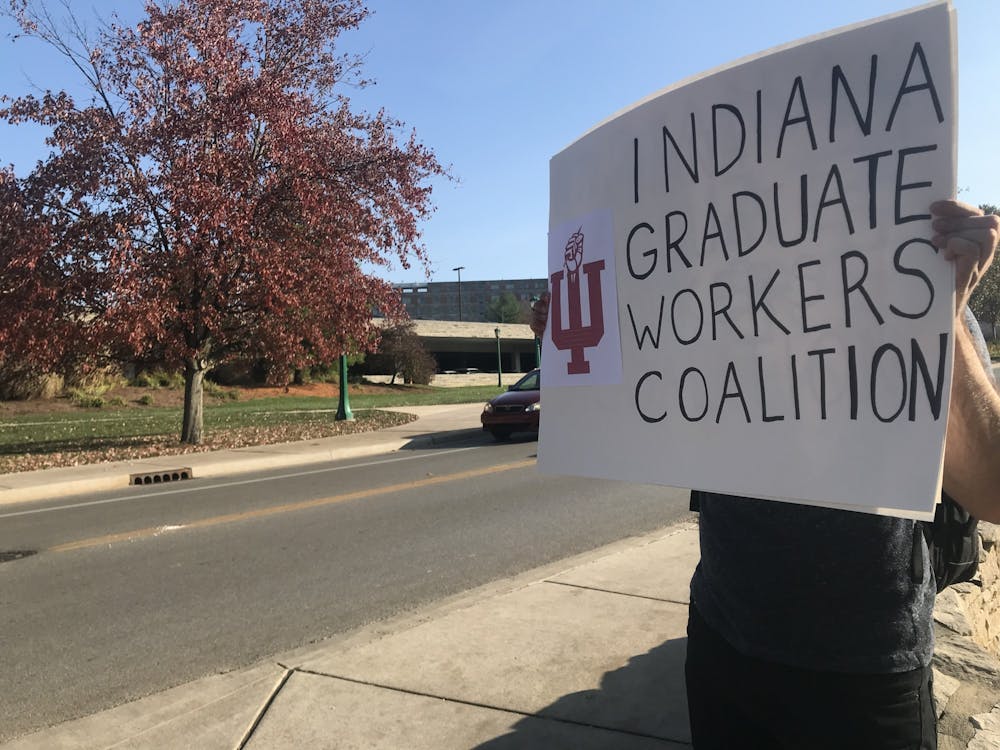Patrons of Richard Wagner’s “Parsifal” lined up Nov. 10 outside of the Musical Arts Center. During their wait, they were met with the homemade signs and pamphlets of the Indiana Graduate Workers Coalition, reading “Behind the scenes.”
“We want to raise awareness about these working conditions that are affecting our friends,” Jacobs School of Music graduate student worker Tyler Erickson said. “Our friends couldn’t be here to speak out about it because they are participating in the opera.”
Around 30 members of the IGWC attended a silent protest before the opening show of the Opera and Ballet theater’s second opera of the 2019-2020 season. This year, the number of operas performed was cut from six to four, limiting the performance opportunities of many Jacobs students. In addition, the university hired 11 professionals for the four-hour opera, taking positions away from music students.
In response, IGWC spread information through bulletins and posters found in the halls of the Music Addition and Simon Music Center, which invited the public to participate in the coalition’s protest. The protest concluded with the concise message: “Fund workers and students, not image.”
“It’s important for us to highlight the work that we do as graduate students and workers who are underpaid and underrecognized by the university and its administration,” coalition member Cole Nelson said.
Nelson, as well as Erickson and Jacobs graduate student worker Chelsey Belt, stood alongside many of their fellow coalition members on the sidewalk leading up to the performance venue. Each member offered informational pamphlets to the guests and then wished for them to enjoy the show.
“It has never been our intention to protest the opera,” Belt said. “Many of our colleagues are backstage and in the pit right now, and we wish them the best in their performance.”
The coalition emphasized that they had no intention to criticize the Jacobs School of Music but rather wanted to advocate for its unpaid performers.
“Our priority today is to be educational and informative, so the very fact that we were able to reach so many people who seem to be receptive to our efforts is a wonderful first step,” Nelson said.
Nelson also recommended others stay updated on the current events surrounding working conditions for graduate students by following the group on Instagram, Twitter and Facebook @indianagrads.
“This is not an isolated event,” Nelson said. “It’s important to recognize the various ways that the university exploits us as graduate workers.”
The coalition emphasized that one of their goals was for the university to reconsider the fees and tuition costs Jacobs graduate students pay. According to the coalition, graduate worker stipends for some Jacobs students can be as low as $3,900 per year once the additional costs are factored in.
“We saw how our colleagues were living and making ends meet,” Belt said. “We saw this production as an opportunity to stand in solidarity with them and let the wider community know about the conditions that they’re living in when they are doing so much fantastic work.”
The coalition hopes to see changes in the future to reduce the debt that many Jacobs graduate students struggle with, to which Belt recommended the creation of more paid performance opportunities.
“Our feeling, in general, is that if they have funding for major beautification projects and events like ‘Parsifal,’ then they have the means to pay their graduate workers living wages,” Belt said.




